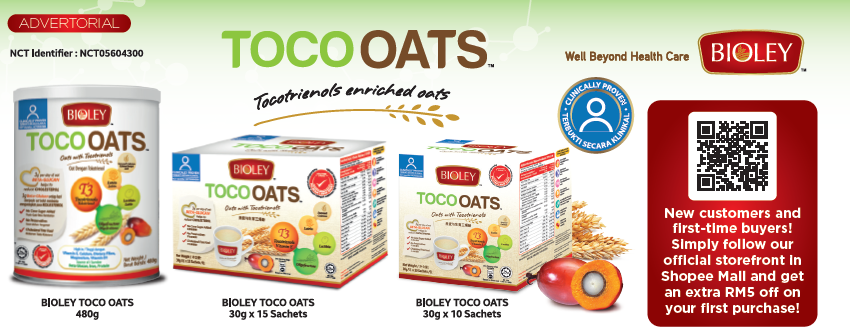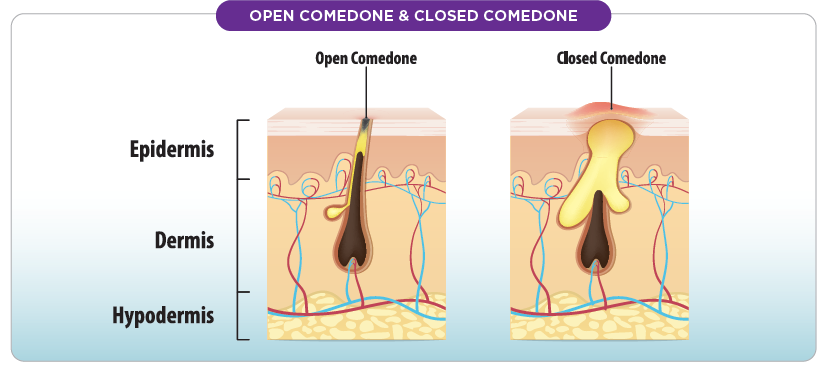This pioneering clinical trial, led by Dr Lee Lai Kuan from Universiti Sains Malaysia, involved 81 MetS patients that consumed two sachets (equivalent of 60 g) of Bioley Toco Oats daily for up to 12 weeks.

RESULTS
Improved Key MetS Parameters
√ 5.5% reduction in fasting blood sugar.
√ 4.3% reduction in diastolic blood pressure.
√ 23% increase in HDL (good) cholesterol.
√ 11.8% reduction in blood triglycerides.
Enhanced Antioxidant Levels
√ Significantly elevated total antioxidant capacity (TAC) and superoxide dismutase (SOD) levels.
√ Reduced protein carbonyl concentration, a marker of oxidative stress.
Anti-Inflammatory Effects
Lowered concentrations of multiple inflammatory biomarkers such as tumour necrosis factor-α (TNF-α), histidine-sensitive C-reactive protein (hs-CRP), interleukin-6 (IL-6), and matrix metalloproteinase-3 (MMP-3). Tolerance Participants did not show any gastrointestinal side effects after prolonged consumption of Bioley Toco Oats.
Tolerance
Participants did not show any gastrointestinal side effects after prolonged consumption of Bioley Toco Oats.
CONCLUSION
The clinical trial findings demonstrate the potential of Bioley Toco Oats in improving metabolic parameters, enhancing antioxidant capacity, and reducing inflammation in individuals with metabolic syndrome.

| IMPORTANT NOTE This product is not intended to diagnose, treat, cure, or prevent any disease. Individual results may vary. A balanced diet and regular exercise are essential for good health. This product should not replace conventional treatments or consultations with qualified healthcare professionals for any medical condition. Always seek proper medical advice for diagnosis and treatment. |
This is an educational article brought to you by

References:
1. Tan, D. T., Khor, H. T., Low, W. H., Ali, A., & Gapor, A. (1991). Effect of a palm-oil-vitamin E concentrate on the serum and lipoprotein lipids in humans. The American journal of clinical nutrition, 53(4 Suppl), 1027S–1030S.
https://doi.org/10.1093/ajcn/53.4.1027S
2. Ajuluchukwu, J. N., Okubadejo, N. U., Mabayoje, M., Ojini, F. I., Okwudiafor, R. N., Mbakwem, A. C., Fasanmade, O. A., & Oke, D. A. (2007). Comparative study of the effect of tocotrienols and -tocopherol on fasting serum lipid profiles in patients with mild hypercholesterolaemia: a preliminary report. The Nigerian postgraduate medical journal, 14(1), 30–33.
https://pubmed.ncbi.nlm.nih.gov/17356586/
3. Mottram, P., Shige, H., & Nestel, P. (1999). Vitamin E improves arterial compliance in middle-aged men and women. Atherosclerosis, 145(2), 399–404. https://doi.org/10.1016/s0021-9150(99)00073-8
4. Khanna, S., Roy, S., Parinandi, N. L., Maurer, M., & Sen, C. K. (2006). Characterization of the potent neuroprotective properties of the natural vitamin E alpha-tocotrienol. Journal of neurochemistry, 98(5), 1474–1486.
https://doi.org/10.1111/j.1471-4159.2006.04000.x
5. Mangialasche, F., Kivipelto, M., Mecocci, P., Rizzuto, D., Palmer, K., Winblad, B., & Fratiglioni, L. (2010). High plasma levels of vitamin E forms and reduced Alzheimer’s disease risk in advanced age. Journal of Alzheimer’s disease : JAD, 20(4), 1029–1037.
https://doi.org/10.3233/JAD-2010-091450







